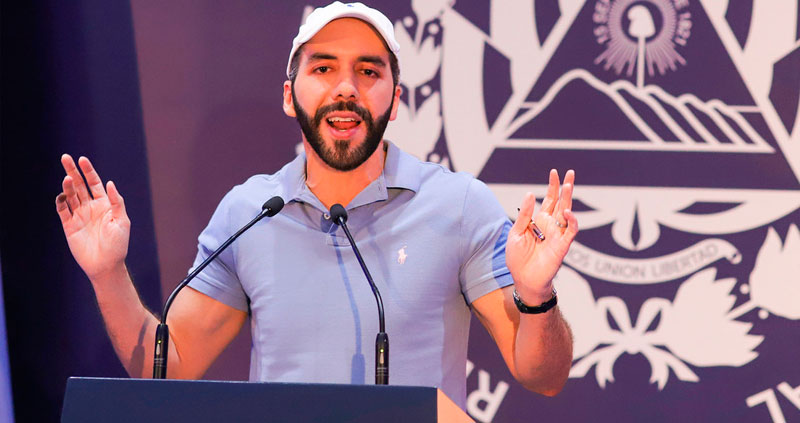President Nayib Bukele has been showing his chest for weeks, but this time it is not because of the impressive reduction in violence in El Salvador, but because of the escalation in the price of bitcoin.
The largest cryptocurrency in the world is the young president’s main economic bet. And also, according to his critics, one of his most opaque policies.
On Thursday, for example, he said on social media that his government transferred “a large part” of the crypto assets held by the state to a “cold wallet” – a file storage device without an internet connection – that will be kept in “a vault.” physics” somewhere in the small Central American country.
Without giving more details, he accompanied his message with an image of the wallet address and the amount received: a total of 5,689 bitcoins, with a value of $406,607,655.
«You could call it our first bitcoin piggy bank. It’s not much, but it’s honest work,” the president wrote.
Skinny cows
In several messages recently posted on their social networks, a photo of a skeleton appears with the phrase: “Still waiting.”
It is his way of saying that he still hopes that analysts, experts and journalists will retract the darts with bad omens that were thrown at him since almost three years ago, when he made El Salvador the first country in the world to adopt bitcoin as a currency. legal tender, along with the dollar.
At that time, in June 2021, Bitcoin was around $35,000 and, after a period of ups and downs, it plummeted to $16,000 in January 2023. Since then, it has continued to skyrocket, reaching new all-time highs in recent days. , exceeding $73,000 per unit.
“When the market price of bitcoin was low, they wrote literally thousands of articles about our alleged losses,” Bukele noted.
And he continued: “It is very revealing that the authors of those opinion pieces, the ‘analysts’, the ‘experts’, the ‘journalists’, are totally silent now.”
The wind in favor
Bukele now has the wind in his favor, but in the lean months he was the one who kept silent about bitcoin. The star cryptocurrency, in addition to being the first to be created, is the one with by far the largest market capitalization.
Its price has been strongly boosted by the entry of large investment funds: in January, the Securities and Exchange Commission (SEC), the US stock market supervisor, authorized the creation of exchange-traded funds (ETFs) linked to the spot price of bitcoin.
Added to this is the expectation generated by the arrival of the next reduction in the pace of bitcoin creation, scheduled for April. This is what is known as ‘halving’, a phenomenon that occurs approximately every four years, when ‘miners’ receive half of the reward for mining the currency to reduce the number of units that enter the network.
Historically, as it is a deflationary currency, Bitcoin has appreciated greatly after each halving, and experts believe that this time it will be no different.
Lack of transparency
But the criticisms are not unfounded. Bukele’s strategy with bitcoin lacks transparency and is full of unfulfilled promises.
After several large purchases of bitcoins with the State coffers, in November 2022, Bukele said he would acquire one cryptocurrency a day. However, there is no official accountability in government institutions and the only thing known about it is through the Salvadoran president’s publications on social networks.
According to the website nayibtracker.com, endorsed by Bukele, El Salvador has 2,864 bitcoins this Wednesday, worth 194 million dollars, a figure almost 60% higher than what the State would have invested. That amount, however, is half of what, according to its announcement this Friday, was transferred to a cold wallet.
An investigation by the Organized Crime and Corruption Information Project (OCCRP) reveals that the Bukele government would have diverted a loan of 200 million from CABEI, the largest development bank in Central America, intended to support small and medium-sized businesses during the pandemic , to finance “his failed plan to convert bitcoin into national currency.”
Unkept promises
Bukele also promised to build ‘Bitcoin City’, a cryptocurrency paradise on the coast of the small Central American country, on the slopes of the Conchagua volcano, which was to supply the city with its geothermal energy, and very useful given the high cost of ‘mining’. ‘bitcoins.
In addition, he said that the construction of the city was going to be financed with the Volcano Bonds, for 1,000 million dollars. But neither one thing nor the other came out, for now, on paper.
To stimulate the use of bitcoins among the population, the government opened a digital wallet called Chivo, with the equivalent of $30 in the cryptocurrency for each citizen.
But there were many reports of accounts being hacked to steal that money. It should be remembered that El Salvador has used the dollar since 2001, which may discourage the use of the digital asset.
According to a survey by the José Simeón Cañas Central American University, 85% of the population did not use cryptocurrency in 2023. In addition, only a small percentage of remittances that the large Salvadoran diaspora sends, especially from the US, and which are Vital to the country’s economy, they arrive in the form of bitcoin.
This week, the National Assembly approved the elimination of the 30% income tax for monetary transactions of remittances and foreign capital investments, including those made in the official cryptocurrency. With RT
